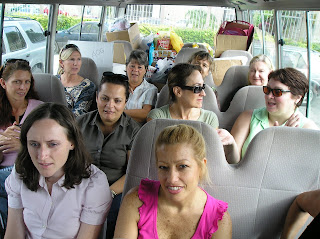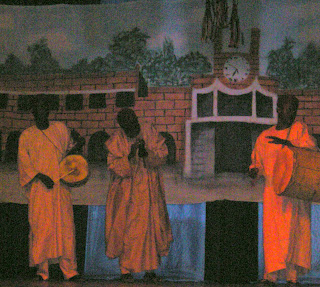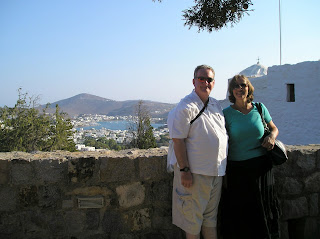
Tonight Brent and I and a friend who's an officer at the US Consulate attended a performance of Beethoven's Ninth. It was one of those experiences that remind me, "Carolee, you're not in Houston anymore." Tonight was the opening concert of the Muson Center's Fall Music Festival. Muson stands for the Musical Society of Nigeria. I didn't have high expectations for this performance -- what I had heard about the Muson's orchestra was "well, it's nice that they're trying so hard." I've performed this work many times with the top notch Houston Symphony and Chorus and with some of the finest orchestral conductors around, so I was just hoping that it wouldn't be painful. When I heard the orchestra tuning I realized that it
would be painful. The brass players were especially oblivious to their tuning problems. The orchestra had to do some shuffling of parts -- their woodwind section consisted of 3 flutes and 3 clarinets and a bassoon. Most often a clarinet played the oboe part, sometimes a flute took the part. There were no french horns -- the brass section was just trumpets and trombones. Although there were 4 chairs set up for the soloists, there were no visible risers for the chorus and the chorus hadn't been mentioned in the publicity for the event, so I was a little worried that they were going to have a recorded chorus or something. There was a flat screen beside the stage playing ads through the concert -- I wondered if maybe they'd show a chorus on screen there. But before the 4th movement, the chorus came on and crowded in behind the orchestra. The women in the chorus wore these striking orange-red iridescent dresses. What a relief when the soloists started singing and I realized they were a few steps above the orchestra in quality. Though they had some unique pronunciation of the German text, they handled the music quite well. The chorus was not polished, but they sang with energy and they knew their music well. There were a couple of times when the orchestra and chorus and soloists were off by a beat or so, but it was resolved within a few measures.
I don't want in any way to show a lack of respect for these Nigerian musicians. (The racial mix, by the way, was quite different from that we have in Houston -- the orchestra had 2 token white faces -- no Asians in sight -- and there was 1 white in the chorus.) The pink rubber bands visibly holding together the shoes of a violinist in the front row was a reminder to me of the challenges many of these musicians likely have had to face in getting as much training as they have. This Western orchestral music tradition is not theirs and it had to be difficult to find teachers and instruments in this city of over 14 million people that doesn't even have a single piano store. I do think it's great that they have the chance to perform wonderful music and it was obvious from the faces of the instrumentalists and chorus members and soloists (who sang along with the chorus parts when they didn't have a solo line) that they were relishing it with the same exhilaration that I feel when I perform it.
The real miracle began for me in the 3rd movement when it opens with that quiet woodwind section that is so lovely when performed by the Houston Symphony. This group was really struggling through it, but in the midst of their struggles, I could hear in my mind the beautiful harmonies of the Houston Symphony. When, in the 4th movement, the cellos introduced the theme and the lone string bass player was scrambling to keep up and was a quarter-step under pitch, what I felt I heard was the incredible unison of the low strings of the Houston Symphony. When the chorus joined together for that first 4-part "Freude..." it was easy to be reminded of the many times I've had the opportunity of singing that exciting theme with the Houston Symphony Chorus. When the concert began, I was worried that it would be a miserable experience. When it ended, it was an amazing testament to me of the power of music in using our memory to return us to meaningful places and experiences in our past. Through the many wonderful opportunities I've had of performing that brilliant work with such talented and well-trained musicians as I was able to associate with in Houston, the beauty of it has been imprinted on my soul. I was able to transcend this poor performance and return to the many beautifully rewarding performances in which I have had the privilege of participating.
Tomorrow night's concert is one of indigenous social music with drum and a traditional flute called an algaita, along with a Maliki cultural dance troupe. I'll go and enjoy being totally unable to assess the quality of the performance!

















































